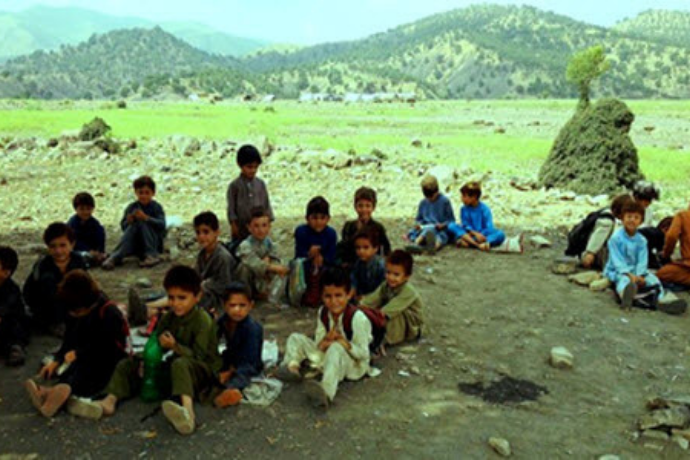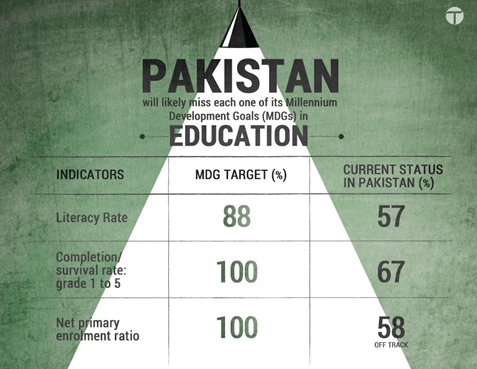
Education Budget for 2018-2019
Education Budget for Fiscal Year 2018-19:
|
HEC Budget for FY 2018-19
|
Education Affairs and Services Budget for FY 2018-19
|
Pre-Primary, Primary and Secondary Education Affairs Budget for FY 2018-19
|
|
Rs 111.23 billion has also been earmarked for Higher Education Commission (HEC) including Rs 46.23 billion under the Public Sector Development Program (PSDP) and Rs 65 billion for recurrent budget for next fiscal year as compared to Rs 95.8 billion including Rs 35.6 billion under the PSDP and Rs60.2 billion for recurrent budget for the current fiscal year.
|
Education Affairs and Services have been provided with Rs 97.42 billion in the budget estimates 2018-19 as compared with Rs 90.516 billion in budget estimates 2017-18 and Rs 90.818 billion in revised estimates 2017-18. The bulk of expenditure at Rs 71.824 billion has been allocated for Tertiary Education Affairs and Services in budget 2018-19,
|
The government has earmarked Rs 10.12 billion for pre-Primary & Primary Education Affairs for 2018-19 against Rs 8.748 billion for 2017-18, Rs 12.365 billion earmarked for Secondary Education Affairs & Services for 2018-19 against Rs 10.798 billion for 2017-18, Rs 71.824 billion for Tertiary Education Affairs and Services against Rs 68.252 billion earmarked for 2017-18 which was later revised to Rs 68.468 billion, and Rs 1.588 billion for administration against Rs 1.286 billion for 2017-18 which was later revised to Rs 1.288 billion.
|
Source:
https://propakistani.pk/2018/04/28/education-budget-for-fiscal-year-2018-19-announced/
The Millennium Development Goals (MDGs) of universal primary school access, improvement in retaining students and increasing adult literacy have yet to be achieved. The Pakistan Social and Living Standards Measurement Survey 2013-14 is proof of this failure. The status in 2015 was as follows:

Source:
https://tribune.com.pk/story/946594/why-25-million-children-are-out-of-school-in-pakistan/
Hence as of 2015 about 25 million children are not enrolled in school despite the rise in population in the country.
Saman Naz is the data and evidence campaign manager at non-profit Alif Ailan, which aims to improve education in the country. She is concerned about the authenticity of the data available about education in Pakistan. As a result she fears officials not providing the correct number of out-of-school children. Due to instability in the country in terms of changes in government, terrorism, economic instability, etc, education has really suffered. According to Saman, the government fails to provide free and compulsory education to children between the age of 5 and 16 years.
The availability of resources such as proper buildings, qualified staff, schools within student access, stationary, etc, is another challenge for the education sector. For example, some schools are located in areas that are hilly and steep and therefore unsafe for children to go to on their own. A school in Mang village has been turned into a stable as no class ever took place in the vicinity for seven years.
The government needs to wake up and make some changes. The very first step would be to make education a priority and make this evident in the budget. Education must be allocated sufficient resources so that every child can be sent to school. Further there needs to be a proper system in place to track the progress of education. There is no check on government schools i.e. whether children are attending schools or not, are teachers coming to schools and making their efforts, are there enough resources to ensure smooth functioning of schools etc.
The private sector can be asked to help. The government can pay a fee to private school owners for developing an efficient system to ensure government schools are operating efficiently. If everything is computerized the government can track things online. For example, a management information system for teachers’ attendance can ensure that teachers are punctual and are attending school regularly. To address issues such as floods, earthquakes etc which make it difficult for students and teachers to reach schools, laptops should be provided so that classes can be conducted via skype. This definitely needs money and effort but look at its benefits. One laptop for one family could mean educating all the children in that family. An educated family means an educated Pakistan. These Pakistanis will be getting good jobs and thus adding to the economy of the country. Thus the budget for education can be justified. And after all, education is the right of every child irrespective of caste, color or creed! Hence there should be no compromise on education and every effort should be made to make it available.

